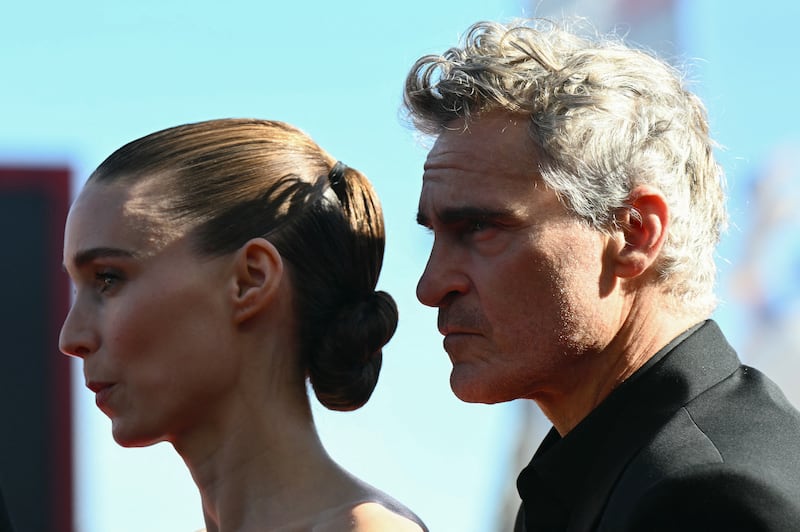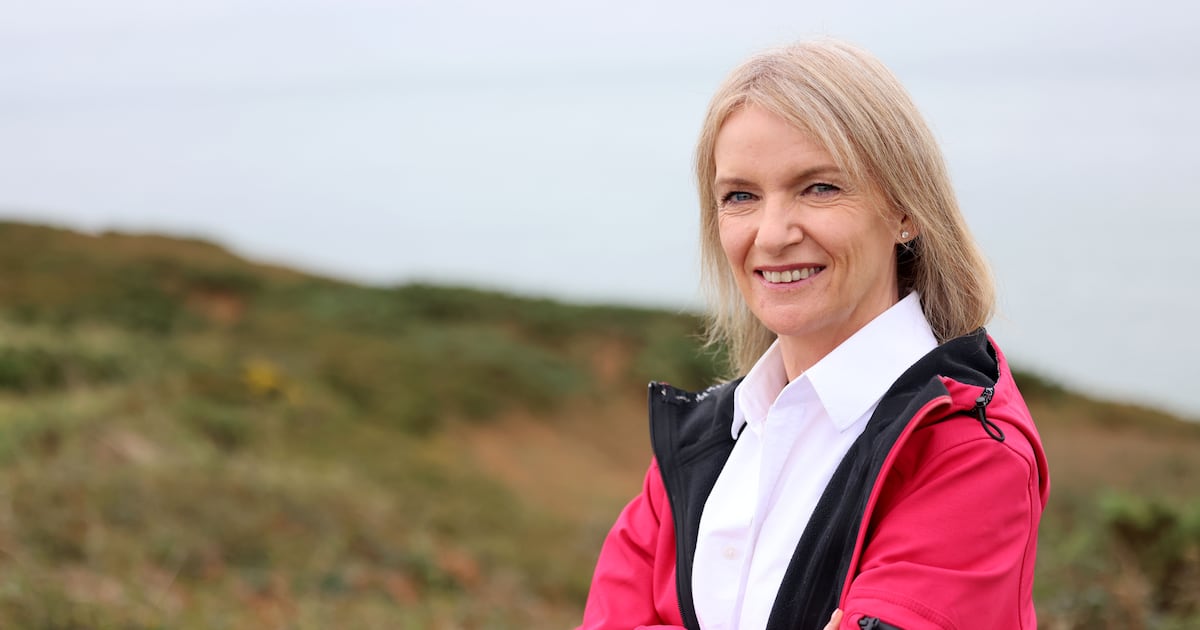It was a mixed picture for Joanna Donnelly as she launched her presidential campaign this week. The former TV meteorologist opted to embrace uncertainty, declaring her intention to run before attempting a forecast of how it might go.
“I was advised to consult with people that have run before but I have not done so yet,” she told Virgin Media’s Tonight Show as her bid for the Áras roared to life.
On the subject of winning, she went on: “I’ve never run a campaign. I’ve never been involved in any sort of campaign in my life. So I have no idea if that’s something that can happen.”
For good measure, she added: “I expect nothing from this.”
That’s optimism for you. Her campaign spell lasted three days before it was dampened by her realisation she was “wholly unprepared”.
“I think it’s best if I withdraw my request for a nomination at this point,” she said on Friday.
Donnelly left her previous job – a Civil Service gig as part of Met Éireann rather than a semistate one at RTÉ – after persistent clashes with management over stringent rules about outside engagements.
A curious decision, then, to seriously consider the gig with the worst scrutiny-to-remuneration ratio of any in Ireland: the role of presidential candidate.
Had she persisted and succeeded with her campaign, however, she would have found there isn’t really a HR department to answer to at Áras an Uachtaráin. Convention states that the president must act presidentially, keeping their counsel on live political issues and shunning sponsored content opportunities on Instagram. But there’s not much in the employee handbook (Bunreacht na hÉireann) about written warnings.
It would certainly be unconstitutional to keep up paid side gigs – “The President shall not hold any other office or position of emolument” (Article 12.6.3). But reprimanding the Uachtarán involves quite a lot of work for other elected representatives, including a letter of charge signed by 30 members of the Oireachtas, a vote, an investigation and another vote requiring a two-thirds majority of both houses.
It’s also unconstitutional to cut the president’s pay. And, apart from the free house in the park, there are other perks: plenty of opportunities to make pronouncements, as Michael D Higgins has found.
President Michael D Higgins and Bob Geldof at the Iftas in 2023. Photograph: Nick Bradshaw The seven-year itch
Speaking of Michael D Higgins, he cropped up in Overheard’s casual reading this week.
In Spring, Summer and Fall, the political memoir of former Labour Party operative Ray Kavanagh, there’s an account of the party’s machinations around this time in 1997, in advance of Mary Robinson’s departure from the Áras. The parliamentary party met in Mullingar on September 9th to consider strategy.
“First of all, Michael D Higgins let it be known that he was available as a candidate for the presidency: an offer that did not receive much support,” writes Kavanagh.
“He did strike a chord, however, when he said that the idea of the Labour Party supporting Bob Geldof scratching himself for seven years in the Park was offensive.”
The anti-poverty campaigner, singer and honorary knight of the British Empire had been linked in the media to a run then, just as he is now. The then Labour Party adviser Fergus Finlay denied flying kites for him, though admitted they’d been in contact. Labour went for activist and anti-nuclear campaigner Adi Roche in the end; Mary McAleese (Fianna Fáil’s candidate) won.
Labour (2025) has already plumped, with some hesitation, for Catherine Connolly, perhaps illustrating that its thinking on the Geldof question has not evolved as much as its thinking on the Higgins question.
Former footballer Michael Darragh McAuley and Senator Frances Black at a rally for the Occupied Territories Bill. Photograph: Collins Green light for Israel import bans
A bad summer for Irish soft power in Britain, where musician Hozier at Reading joined Belfast rap group Kneecap at Glastonbury on the BBC’s large, flashing “this musical artist may say something about Palestine” list and author Sally Rooney faces potential arrest without a warrant on terror charges should she ever alight at Heathrow.
There has been better luck on the Continent where gallant little Belgium and even littler (and possibly therefore gallanter) Slovenia have announced bans on imports from illegal Israeli settlements in the West Bank.
Our own version of the Occupied Territories Bill remains on the to-do list for legislators. But the international running on this is decidedly made in Ireland, where the OTB was born in 2018, well before the current conflict.
It’s not quite as public as getting censored by the BBC, but non-rapping Irish campaigners, diplomats and politicians have spent several years trying to beat a legal path through the bureaucracy, with some success, for countries that want to do something. Where once any action on trade was considered an all-or-nothing EU matter, and therefore vulnerable to a veto by Germany, the Irish delegation has helped make the case that countries can go it alone, given how extreme the situation has become. That was underlined by EU foreign policy chief Kaja Kallas’s “options” memo in July, which gave the tacit go-ahead to national governments.
[ EU action against Israel over Gaza is ‘long overdue’, Simon Harris saysOpens in new window ]
So a green light for Ireland, and a green light for Belgium and Slovenia, where politicians ploughed on despite less than €2,000 worth of imports at stake. Perhaps others will follow?
The team behind the OTB will hope so. Various nations and NGOs have been consulting them this summer on how such a move would work in practice. They briefed MEPs from a number of countries yet to act, including the less little likes of France and Spain.
 Joaquin Phoenix and Rooney Mara on the red carpet in Venice earlier this year. Photograph: Stefano Relladini/AFP/Getty A-listers abound
Joaquin Phoenix and Rooney Mara on the red carpet in Venice earlier this year. Photograph: Stefano Relladini/AFP/Getty A-listers abound
You never know who you might bump into on a Dublin street. Outside Dublin’s Olympia Theatre earlier this week before a performance of Conor McPherson’s The Weir, Overheard spotted a couple dressed in black in front of the thronged theatre door, the man swiping at his phone like the rest of the ticket holders. Hollywood stars Joaquin Phoenix and Rooney Mara went largely unrecognised.
So what brings this showbiz couple to Dublin beyond seeing star turns from Brendan Gleeson and co? Rooney Mara – could we call her Máire Rooney? – and her sister Kate spent some months in Dublin earlier this year working on a new movie called Bucking Fastard from German director Werner Herzog. It was filmed in Dublin and in Naas, Co Kildare.
And Oscar-winner Joaquin – let’s call him “Whacker” Phoenix, a true Dub – appeared with Gleeson in Batman spin-off Joker: Folie a Deux, so a post-show meet-up on Monday would not have been unexpected.
They are among an ensemble cast of A-listers knocking around the capital this summer, from actor-director Maggie Gyllenhaal (a foodie, we hear) to comic actor Steve Carell (straight to the pub) to Pakistani-British human rights activist Malala Yousafzai, who was here for Oasis.
No doubt Phoenix will have enjoyed the pub banter in McPherson’s play, including a barb from one character mocking the stinginess of another: “That fella’d peel a banana in his pocket.”

